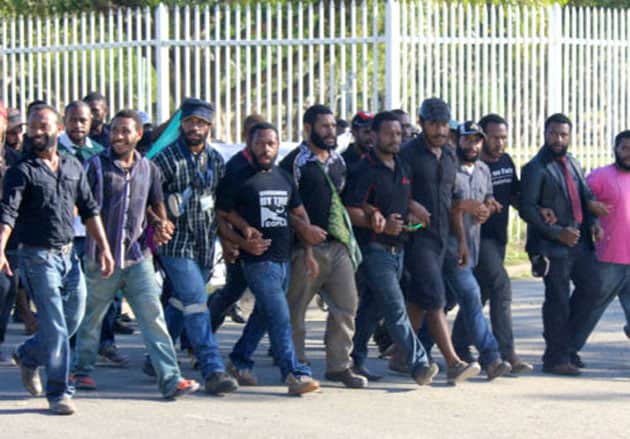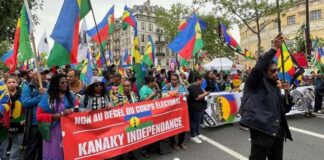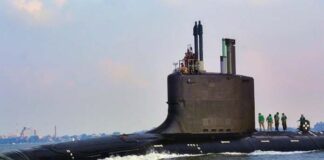Police have shot students at the University of Papua New Guinea (UPNG) this morning, leaving at least 23 injured, some critically.
“The planned peaceful march to Parliament was stopped by heavy police presence in front of the main gate,” explained UPNG academic, Patrick Kaikua on Facebook.
“These policemen were heavily armed to the teeth. After giving several warnings for students to go back into the campus tear gas canisters and live rounds of ammunition were fired to disperse students.
“In the confusion female students were trampled on. Shrapnel from the ammunition hit students. One student got a wound in his stomach and another in the head … It was like a war zone this morning, reliving the 2001 protest we did.”
Patrick is a supporter of the student strikes, which began five weeks ago. Students at four universities have boycotted classes in their fight to have Prime Minister Peter O’Neill step aside and face investigation for corruption by the Police Fraud Squad.
The squad believes O’Neill is connected to a scam that saw $30 million of PNG public funds paid to the company Paraka Lawyers for work never done. Investigators say O’Neill signed the letter of authority for the money, which was laundered in Australian banks. O’Neill claims his signature was forged.
For two years, O’Neill has dodged investigation through legal manoeuvres.
Since this morning’s shootings, protests have spread throughout Port Moresby and across PNG. Students claim police tried to stop students getting treatment in hospital, leading to a protest outside the hospital where shots were again fired. A journalist with the public broadcaster reported that she was bashed by police and arrested.
Students at UPNG went into hiding, fearing the police. Buildings have been set on fire. Despite multiple reports to the contrary, O’Neill has tried to claim that outside agitators are responsible.
While Australian companies make millions from environmentally destructive mining in PNG, the benefits aren’t shared. PNG is the most unequal society in the Asia-Pacific and ranks lowest of all nations outside of sub-Saharan Africa on the UN Human Development Index. Students have a long history of protest in PNG.
Solidarity spoke with Patrick about the background to the strike a few days before the shootings.
Please introduce yourself, what is your background and what role are you playing in the current student movement?
I teach in the Political Science department. I received my post-graduate studies at the University of Hawai’i and was introduced to community activism work. Part of my interest in this student-led protest is to try to communicate to my students that a spirit of activism is healthy for PNG’s democracy.
As informed citizens I believe students and academics have a moral responsibility to effect change in their communities and take an active interest in the affairs [of] communities.
In the current UPNG-led student protest, I am availing my time to writing up Media Statements and providing strategic advice on courses of action for students to take. I use social media to try to inform other citizens about the issues the students are protesting about. Students are limited in their networking so I have lent my support in connecting with other NGOs and civil society groups to be part of the movement.
How did this movement emerge? What are the main concerns of the protesters? What demands are you putting forward?
The movement emerged out of students’ frustrations with our political leaders, especially the Prime Minister and what we perceived as undue influence on institutions such as the Police and the Courts. When the Police Fraud Squad investigated the fraud allegations against the Prime Minister Peter O’Neill and his role in defrauding the State, the public became concerned the investigations of the Police Fraud Squad were deliberately being sabotaged.
At the UPNG, there is long tradition of student activism. Students since the 1970s have always protested against unpopular government decisions and issues affecting the nation. So there is precedent in what students perceived as an undermining of the laws of the country. So the movement is basically a reflection of growing frustrations that have been brewing since 2014 when the fraud allegations were first exposed.
The main concern of the protesters is for the Prime Minister to show by example that the laws of the country and the principle of due process be adhered to. We are basically demanding that the Prime Minister step aside and allow for investigations to continue undisturbed. His continued presence in the Office of the Prime Minister only prolongs the protracted case against him.
How much support do the protests have amongst the student population? How much support are you getting from the broader community in PNG? Is there any other social forces supporting your movement such as trade unions, churches?
There is overwhelming support by students who are informed about the issues. Although there are voices of dissent amongst students who argue that the protest is being hijacked by the majority, the initial indication is that all provincial leaders voted through consensus that the protest be staged. As far as the broader community is concerned, we are still limited in garnering the support of government agencies and other state entities.
The trade unions are embroiled in their own internal divisions. Some allege that the unions have been politicized by the Prime Minister and certain sectors of the community are too afraid to come out for fear of being reprimanded by the Prime Minister. So in essence the students are up against a resourceful government that is capable of manipulating the media and other areas
of society to its advantage. Cronies of the Prime Minister are believed to be working from their positions of power to somehow frustrate the objectives of the students.
However when the students went out for public awareness in the provinces in the last two weeks, they received support from mostly the grassroots sectors of the
community. In the provinces, people are least informed about happenings in Port Moresby. Hence the public awareness exercise done by students was appreciated by peoples outside of Port Moresby.
What role has the student movement played historically in pushing for progressive change in PNG? Are there any other historical movements that the students are looking to for inspiration?
Student-led activism has always been vibrant. In the 1980s we had the Melanesian Solidarity, a student-led movement in the UPNG that was vocal on national issues. Some of the leaders of that movement are now in government and private sector. In the early 2000s, the death of three University students in the anti-land mobilisation agenda of the government is a celebrated event. Students use this as an example of sacrifice for the nation.
Australia has a long history of colonialism in PNG. What role do you see Australia playing now in PNG? What about Australian corporate interests?
The corporate interest of Australia in PNG are centred mainly around the extractive sector. From the days of the Bougainville Copper Limited to the Ok Tedi mine, you will find that Australian companies are mostly investing in the mining, and presently the LNG sector of the economy. There are some financial service sectors such as banks and insurance firms that are Australian-based operating in PNG as well.
There is a strong campaign in Australia against the detention centre that the Australian government has established on Manus Island for refugees. Do you have any comments about this centre and what this says about the role of Australia in your country?
The establishment of the centre was protested against from day one!
PNG’s state institutions has its very weak points in terms of upholding basic principles of human rights. When the refugees are brought in, it creates additional stress on the institutions and agencies already here in PNG. The Immigration department, the Police and welfare agencies are unable to manage the
centre.
Coupled with that, the use of Manus as an offshore processing facility is treated as a violation of the territorial space of PNG. We have heard reports of Australian army personnel and other Immigration officials coming into PNG circumventing the laws of PNG. For instance, the rape of a Manus woman by an Australian security guard has gone unpunished because the Australian was able to flee the country before
the criminal investigations were conducted. So it is really a sell-out deal our government got ourselves into.
What would your message be for people in Australia concerned about social justice for the peoples of this region? How can we support you?
Perhaps building people to people relationships is the first priority. At the official level, the government of Papua New Guinea is only concerned about how much aid money it can squeeze out of the genuine Australian taxpayer. But at the level of the grassroots, it is about creating networks for purposes of developing ourselves in
our communities. We have people who take their own initiatives to change their communities. When they interact with outsiders (Australians) and through simple training activities or workshops or other forms of educational exchanges, they feel empowered and are willing to trial new ideas in their communities.






